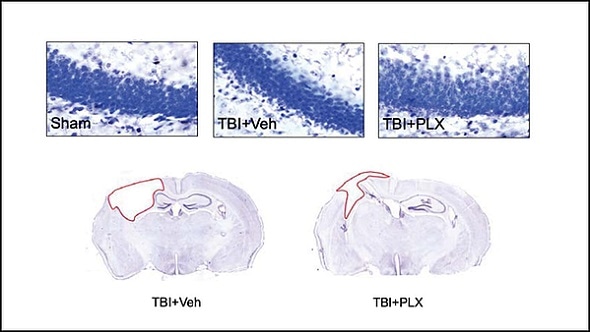Targeting overactive immune cells and dampening their effects may serve as a new treatment for treating a traumatic brain injury, according to new research in mice published in JNeurosci.

Time is of the essence when treating a traumatic brain injury (TBI). Triggered by trauma, microglia – the brain’s immune cells – morph into an inflammatory state, which helps to protect the brain. However, long term inflammation may contribute to neurological degeneration after a TBI.
Henry et al. report that quelling such chronic inflammation, even months after the injury, could serve as a new treatment for TBI. One month after a TBI, the team inhibited a receptor microglia need to survive. The inhibition killed 95 percent of the mice microglia cells. However, the cells bounce back to normal levels once the inhibition ends. The researchers stopped the inhibition after one week and let the mice recover for a few months. The inhibition “reset” the mice’s microglia: the new cells were in a more normal, less inflammatory state. The mice recovered better than the mice that didn’t receive treatment, showing less brain damage, fewer neuron deaths, and better motor and cognitive performance. Targeting inflammation pathways could treat the chronic consequences of a TBI long after the initial injury.
Source:
Journal reference:
Henry, R.J., et al. (2020) Microglial depletion with CSF1R inhibitor during chronic phase of experimental traumaticbrain injury reduces neurodegeneration and neurological deficits. JNeurosci. doi.org/10.1523/JNEUROSCI.2402-19.2020.